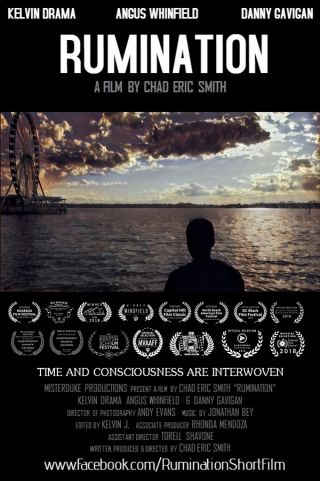Relationships
Breaking Up Hurts, but Dwelling on the Past Can Hurt More
The film "Rumination" depicts how rumination can intrude on one's life.
Posted April 23, 2024 Reviewed by Abigail Fagan
Key points
- Heartbreak is one of the most common shared experiences among people.
- Unrequited love, in particular, can result in feelings of sadness and a desire to regain love lost.
- Rumination can hinder the healing process and one must discover ways to cope.

Heartbreak is one of the most common shared experiences amongst humans. It is described as a time of affliction involving grief accompanied by painful sorrow. Unrequited love, in particular, can result in feelings of sadness and a desire to regain the love lost. When one is unable to rekindle such affections, heartbreak can begin to feel unbearable. Continuous thought regarding the object desired becomes fixed in the mind. Rumination hinders the healing process and one must discover ways to cope with one’s thoughts. Elliot, performed by Kelvin Drama in the short film Rumination, produced by Chad Eric Smith, found himself in a state of great grief after a romantic breakup and experienced the anguish of ruminative thought.
Baer, (2017) described that the experience of romantic love is similar to drug abuse, as “just like drugs of abuse, romantic love — ‘a normal altered state’ — starts with euphoria and ends with craving” (p. 4). Specifically, when one person’s love is no longer offered, the individual who continues to desire the love longs for what is lost. Rumination, defined as “simply repetitively going over a thought or a problem without completion” (Wehrenberg, 2016 p. 1), upon the lost object can be used as a method to manage the absence, where the thought of the person remains ever-present in one’s mind. However, in doing so, the repetitive focus on the “symptoms of distress and the possible causes and consequences of these symptoms” (Nolen-Hoeksema, 1991) also ensures that the pain associated with such thoughts persists. Thus, when rumination surfaces, the recovery of the painful event may be hindered.
Within the film Rumination, Elliot wakes from a nightmare that illustrated the joyful interactions had with a female companion. Wet with sweat, Elliot’s life confirms the validity of his nightmare. He is alone, and navigates his morning like many, grooming and preparing for his day. Coping with the loss of the relationship appeared to be a struggle for him. He and his partner, captured in a loving embrace, are pictured in a framed photo portrayed in his home. Attempts to manage his feelings of anxiety and depression with psychopharmacological medications are available to him in his lavatory. Despite his efforts, Elliot finds himself desperate and “willing to try anything” to discontinue the painful experience of ruminating over the ending of his relationship.
“The Response Styles Theory posits that rumination may prolong and exacerbate distress in response to stressful events” (Tran & Joormann, 2015, p. 56). Unfortunately, when one is primed to ruminate, the process is automatic, “difficult to control and is triggered by cues that remind the person of the negative event” (Tran & Joormann, 2015, p. 56). Ruminations are not at all purposeful; rather, they can be intrusive and unwelcome by the recipient. Additionally, ruminations “raise anxiety and anxiety interferes with solving problems. Then depression deepens” (Wehrenberg, 2016, p. 1). As a result, conceptualizing solutions during these times may be difficult when preoccupied with the circular thoughts that rumination yields.
Wehrenberg in 2016 suggests that “the better you get at interrupting rumination, the lighter your depression will become. It is possible to stop brain patterns that contribute to anxiety and depression by stopping rumination” (p. 4). When unsuccessful, rather than rely upon his internal resources, Elliot learned of an alternative method to alleviate his ruminative thoughts, one that provided him the hope to repair what caused his pain and restore his lost relationship.
Rumination is an intriguing psychological, sci-fi short film that illustrates how the experience of heartbreak can influence the presence of ruminative thoughts that have the power to negatively impact one’s affect and mood. Equally, this film depicts the torment rumination can cause, which has a significant influence on one’s overall emotional presentation. Yet, there is hope. Even if one is unable to travel in time as Elliot discovers, one is able to change one’s environment to lessen triggers, occupy time with pleasurable tasks, and use a host of strategies to lessen the painful consequences rumination can cause.

References
Baer, D. (2017). Heartbreak looks a lot like drug withdrawal in the brain. https://www.thecut.com/2017/02/why-heartbreak-getting-dumped-feel-so-bad.html
Tran, T.B. & Joormann, J. (2015). The role of Facebook use in mediating the relationship between rumination and adjustment after a relationship breakup. Computers in Human Behavior, 48, 56–61.
Wehrenberg, M. (2016). Rumination: A problem in anxiety and depression. http://www.psychologytoday.com/us/blog/depression-management-techniques/201604/rumination-problem-in-anxiety-and-depression


